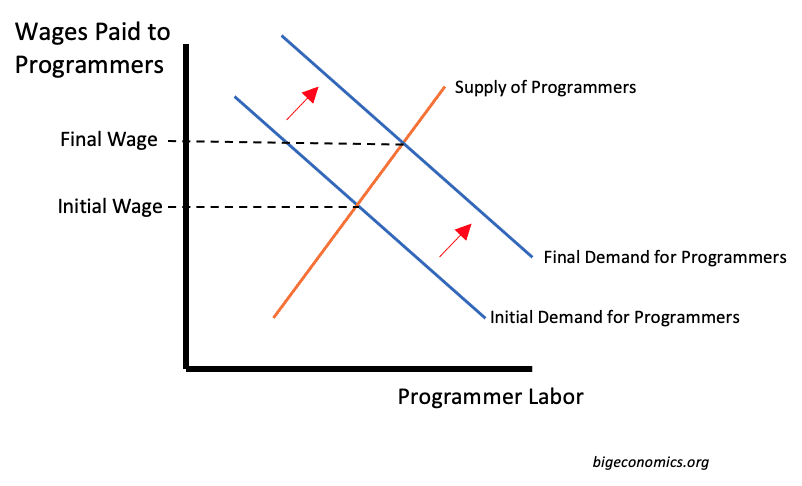In 2019 a fast-food worker made $25,000 per year while a specialized medical doctor made close to 10 times as much, at $250,000 per year.
Why do some jobs pay more than others?
Pay is just the price of labor, so like all prices, it’s determined by demand and supply forces. Employer demand depends on how much value the job creates. Supply depends mainly on skill: how many other people can do the job.
So a high-value high-skill job pays very well (doctor), while a low-value low-skill job (fast food worker) pays very little.
Understanding how wages are determined is helpful not only if you’re deciding what career to go into, but also how to boost your wages if already in a career.
Two Main Factors That Affect Supply of Workers
Trying to understand how wages are determined goes way back, even Adam Smith over 200 years ago theorized that wages were determined by the difficulty of learning a job and how unpleasant the job conditions are1.
This makes sense if you think about it. The difficulty of learning the job and the unpleasantness of job conditions determine how large the pool of laborers is that can do the job. The fewer workers that are able or willing to do the job, the higher the wages. Plus workers have to be paid for the expense of the training they went through.
The Difficulty of Learning The Job
Working at a fast-food place requires no advanced training or study, thus we’d expect their wages to be among the lowest, as they are. Anyone could do it; the pool of potential workers is enormous.
Working as an electrician requires a 2-year degree and some on the job training. The required training means fewer people are eligible to be electricians, thus their wages will be higher.
Becoming a specialized doctor requires many years of schooling and training, thus the supply of specialized doctors is extremely scarce, and they will receive among the highest wages.
Notice that for every year an electrician or doctor spends going to school, not only are they having to pay tuition, but they are missing out on the wages they could have earned if they instead were working.
This is another reason why they are paid higher wages in their jobs: they need to be paid back for the tuition they paid and wages they missed out on – otherwise it wouldn’t make sense to get that training in the first place.
The Unpleasantness of Job Conditions
The education requirements for becoming an electrician or paralegal are both 2 years. Yet the electrician’s wages are higher. The reason for this is the second factor in wage determination: job conditions.
The electrician works in freezing cold and suffocating heat, the paralegal works in an air-conditioned office. The electrician faces a risk of death or injury every day he reports to work. The paralegal only worries about eye strain and carpal tunnel.
How does this affect wages? Seeing the unpleasant conditions, fewer workers will decide to become electricians and employers will need to pay them higher wages in order to attract enough electricians. Jobs with unpleasant work conditions are paid higher wages.
This factor helps explains why truck drivers, coal miners, and oil workers are paid so well relative to the skills required.
Market Demand Affects Wages
Just like the supply side of labor can affect wages, the demand for labor by firms can also have big effects. Suppose that due to exploding profitability in the tech sector, firms experience a surge of demand for programmers. What will this do for the wages of programmers? They will increase in proportion to the demand as the graph below shows.
But What Determines Demand?
Why are high skilled programmers and scientists in such high demand in the tech sector right now? Because each of these workers generates an immense amount of revenue and value for their firm. A company will not pay a worker more than the value they generate for the firm, otherwise in the long run they would go bankrupt.
Perhaps tough to hear, but if you’re not getting paid as much as you like, it’s probably because you’re not generating that much value for your organization.

Supply of Labor Can Adjust Too
Suppose that the higher wages paid to programmers cause many students to change their major to computer science resulting in an abundance of programmers. What will this do to the wages of programmers? It will decrease them since there is more competition for a programming job.
Unbalanced Supply and Demand Can Affect Wages
There’s a variety of situations, where wages are not allowed to adjust by the market to where supply and demand would naturally have the wages be. Generally, we see this with wages that are higher than they would be in the free market. Some examples of this are the minimum wage law, unions that guarantee above-market wages to their employees, or even a sector that is growing faster than new workers can be trained to join it.
What About Superstar Wages?
Within an occupation, those who are the best at it will receive much higher wages than the average in their occupation. Why is that? Because their abilities and skills are scarce and this causes them to be very valuable to their organization. There’s only one Michael Jordan, but many minor stars and average professional players. Even in the case of wages of superstars, wages are determined by the laws of supply and demand.
This goes for not only athletes, but for marketers, doctors, and chefs. It applies to all occupations.
The possibility of being compensated highly because of your performance is great news. By developing yourself and your human capital – your skills – you can be more productive, and more valuable to your employer and command higher wages.
If you’re interested in reading more on this, I highly recommend Seth Godin’s book Linchpin. He argues that in today’s economy, average no longer cuts it. Average and routine work has been and will continue to be, exported to places like India and China where labor is cheap. Those who win in today’s economy are those that bring their unique gifts and creativity to their work day in and day out. In short, those who generate immense value.
Wrap-Up
That’s it!
In this article we covered how supply and demand determine wages.
Two main determinants of labor supply are how hard it is to be trained to do the job and how unpleasant the job conditions are. Jobs that require more training and are more unpleasant will command higher wages because less people are willing or able to do the work.
Demand for labor by firms responds to market forces. For example, higher demand for tech products would raise the demand for programmers and thus their wages.
We also discussed how market forces can break down causing wages to behave differently from what we’d expect. Some examples of this are labor unions and minimum wage laws.
We talked about superstar wages. That within an occupation the best, that is the most productive, will earn the highest wages. This path is available to anyone and doesn’t necessarily require you to go back to school, which is great news for all of us.
Some questions to ponder if you want to understand this topic better:
Why are some jobs paid more than others? Give some examples.
What did you learn from this article? How did you previously think wages were determined?
Does this discussion apply to government jobs?
What can you do to become more exceptional at your job? What training or resources might help? Who are the “superstars” within your field? How did they do it?



